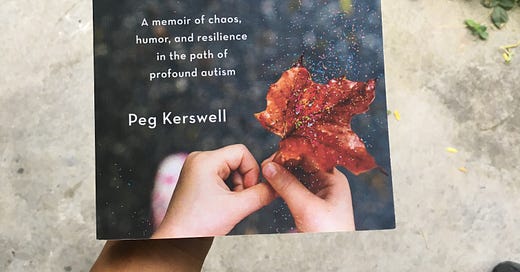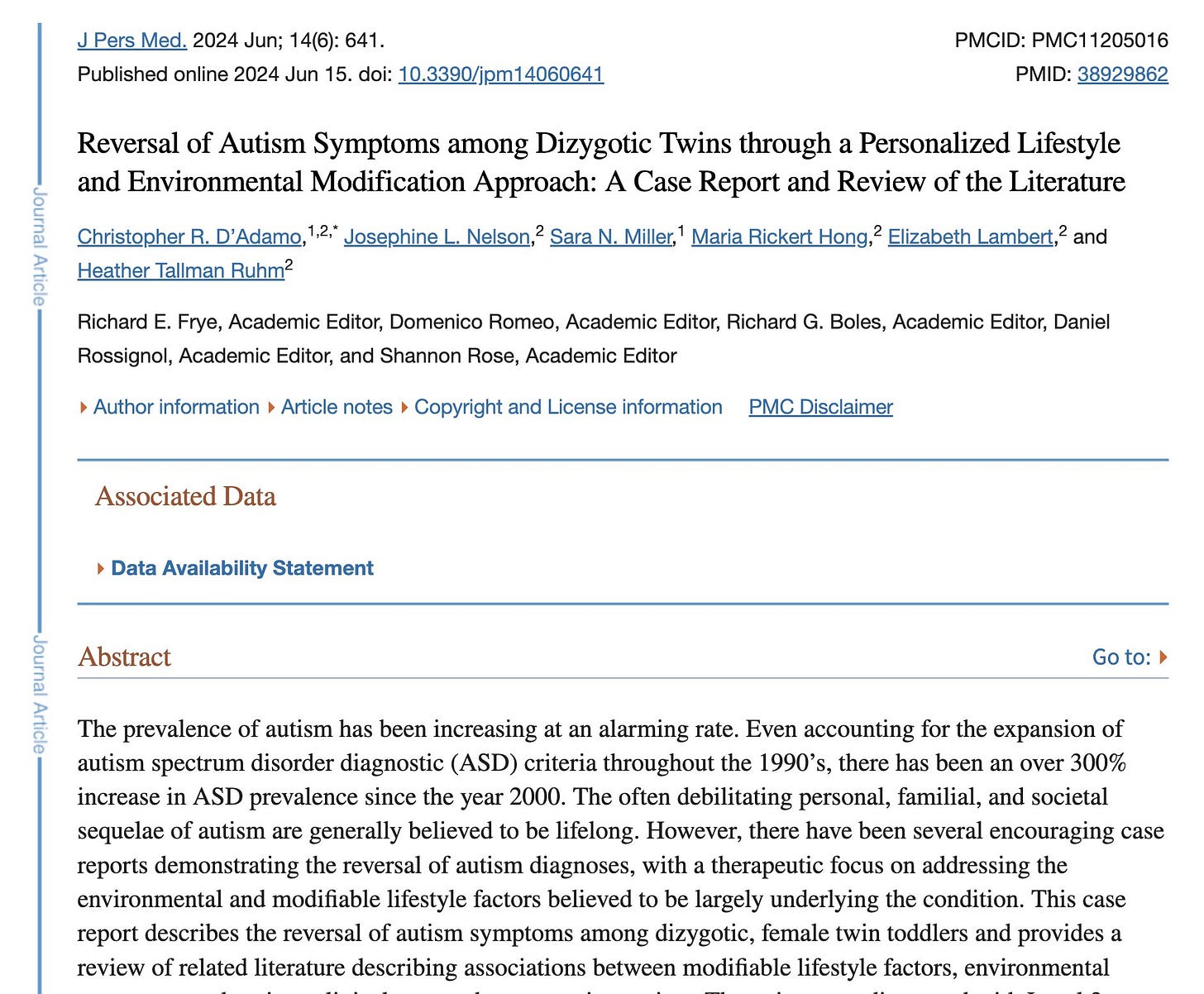Girl Storm (2023) by Peg Kerswell
My review of this "Memoir of Chaos, Humor, and Resilience in the Path of Profound Autism," as it is subtitled.
Girl Storm is a memoir by Peg Kerswell about raising a profoundly autistic daughter and eventually placing her in a home. While reading it, I had to set it down multiple times out of devastation and sadness. The last 15 percent or so of the book is one of the most disturbing things I’ve read. But it’s all written in a clear-eyed, non-sentimental, non-melodramatic manner, and up until it becomes horrifying it has a lot of humor, even though the nonverbal autistic daughter, Ellie, is constantly undergoing tortuous medical procedures and screaming and crying and hitting everyone.
Caring for Ellie seemed to be extremely frustrating and difficult and heartbreaking for Peg and her husband—leading to alcoholism at times for Peg—but it seemed doable, possible, until when Ellie began, at age 13, to hit her head as hard as she can against floors and walls, apparently, to me, trying to kill herself. Peg and her husband pad the walls and floors of Ellie's "safe room" and make Ellie wear a snowboarding helmet.
The memoir doesn’t speculate on why Ellie was hitting her head. To me, it seemed that she started to increasingly hit her head against things—and with her closed fists—because malnutrition, toxification, and years of layered "meds” had made her experience of life so hellish that she instinctively wanted to end it.
Ellie’s parents monitor Ellie and protect her from herself, preventing her from killing herself, but the parents don't have any ways to make her stop wanting to kill herself, and don't seem to be aware that she might be trying to kill herself because it feels excruciating for her to be alive, or maybe they are aware of this on some level but just don’t know what to do about it. I don’t blame.
No one else knows what to do either. Autism, throughout the book, is viewed as genetic, incurable, a mystery. The view that it is caused mainly by environmental toxins is not mentioned by anyone in the book. The word "vaccine" doesn't occur in the book. None of the many doctors that Ellie saw mentioned diet or toxicity, at least not in a way that is mentioned in the book. Everyone just seemed baffled and helpless.
A major point of evidence that autism is not genetic is that cases of profound autism have been rising exponentially along with overall cases of autism. Some argue that expanded diagnoses criteria and greater awareness explain the autism rise (from 1 in 14,300 in 1970 to 1 in 29 in 2020), but studies have shown this is not the case and it also cannot explain the rise in profound autism. There’s no way that millions of nonverbal, self-destructive kids could have been overlooked in the past by parents and doctors. (There are more than a million profoundly autistic kids in the U.S. today.)
Ellie’s apparent drive toward suicide began with one incident where she
dashed across the room, dropped directly from standing onto her knees, and then, with a big dramatic windup, she threw her head down onto the floor so fast and with such unbelievable force that it should have knocked her out.
The hit was hard enough to kill her.
After a few seconds, she brought herself back up to sitting and went back to her stimmables as if nothing had happened.
This continued for a year, intensifying. In one scene, Peg and one of Ellie's therapists watch a video of a camera that is inside Ellie's "safe room," showing Ellie trying to kill herself—
[S]he bolts all over her playroom and smashes her head over and over and over. First on the wall, then the door, then the window. It's like watching a deadly game of pinball. The back of her head. The front of her head. The side of her head. That head. That precious head that I've done everything in my power to protect. To keep safe. To heal. In the past hour she's banged her head hundreds of times. These are not gentle taps. Every hit sends shock waves through the entire house.
Being nonverbal, she can't say that she feels terrible, that life feels so bad that she wants to die. Her parents can't help her, and mainstream Western medicine can't help her. It’s mainstream medicine that, in my view, has caused her autism and then worsened it over thirteen years to the point where she spends her days uncontrollably trying to kill herself, hitting her head as hard as possible.
This continued until finally at age 14 she was placed in a residential facility, where her room was fully padded, so that she could not suicide there either. The memoir ends there, and it’s not necessarily a sad ending. Ellie, at least from Peg’s perspective, seems to do okay at the facility. Peg and her husband seemed to have done everything they could, based on what they knew, to care for Peg.
To me, they were all victims of contemporary mainstream Western medicine. Western medicine started out helpful and non-destructive, with Hippocrates promoting diet and lifestyle as the main determinants of health, but deteriorated in the 1500s and again in the 1900s, when drugs, vaccines, and surgery began to be prioritized (it was sanitation and clean water that reduced disease, not vaccines).
Ellie was lucky in one way. She had two loving parents who stayed together and worked on raising her and who loved and cared for her.
This is a good book to read if you’re feeling depressed in a neurotic way, focusing on yourself too much, complaining about your life, jealous and envious of your peers, thinking that life has been unfair to you, that other people have privilege and you don’t. This book will put things in perspective.
It’s also a good book for anyone to read in order to feel more gratitude for your life. In my view, one of the worst fates for a contemporary human is to be one of the millions of profoundly autistic kids on Earth today whose loved ones believe that autism is genetic.
This belief leads to kids being fed toxic food and toxic drugs—and not getting natural treatments that could help them, like good diets and, to name one method of detoxification, the removal of aluminum from their brains with high-silica mineral water—resulting in what happened to Ellie.
The suicide rate for autistic people is up to ten times the normal rate, and their average lifespan is only 36.2.
Read more about autism in my autism essay and my upcoming nonfiction book Self Heal (which I’ve finished a draft of but am letting sit for around three more months—while I use a low vitamin A diet on myself—before I work on it more).
Here’s a new study—one of many over the past few decades—on reversing autism:






Would you consider lending me your copy?
Is there a brand of high-silica mineral water you recommend? Do you order it online? I’d love to see at some point a sort of “Amazon list” of items you have used for your healing/detoxification journey.